Triffids - Interview
by John Clarkson
published: 25 / 6 / 2006
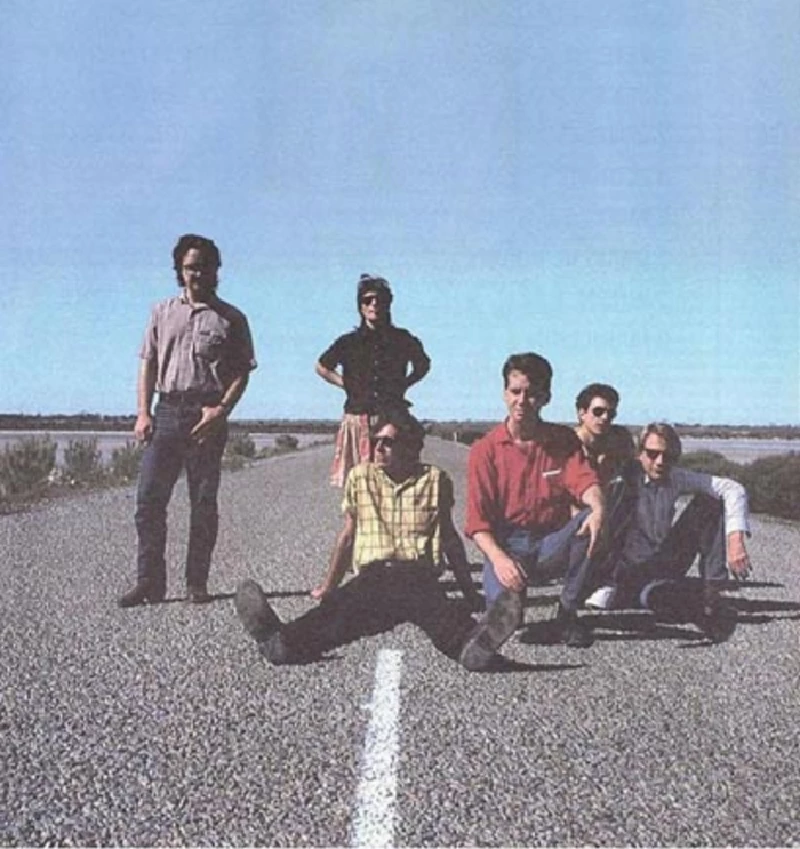
intro
Underrated in their lifetime 80's Australian group the Triffids are in the process of having all six of their albums reissued. John Clarkson talks to he group's pedal steel player and historian Graham Lee about the band's legacy
Shortly after David McComb, the Triffids’ singer and songwriter, died in February 1999, Alsy MacDonald, the band’s drummer, said, in an interview with ‘The Australian’ newspaper, that he thought that “at some stage in the future when people have cause to read his words and listen to the Triffids again, it will surprise them and hopefully delight them how significant that music was for the time it was created.” Seven years after McComb’s untimely death two weeks short of his 37th birthday, MacDonald’s hopes and aspirations for his dead childhood friend and the band they played in together from the late 70's to the late 80's look at last about to be fulfilled. Little known in their lifetime, the Triffids, like the Velvet Underground 15 years on from their demise, are in the process of undergoing a massive re-evaluation. Their third album and masterpiece, 1985’s ‘Born Sandy Devotional’, has just been reissued on Domino Records in a double disc with extra songs to immense critical acclaim. Over the course of the next eighteen months in a rolling programme, the band’s other five studio albums, ‘Treeless Plain’ (1983), ‘Raining Pleasure’ (1984), ‘In the Pines’ (1986), ‘Calenture’ (1987) and ‘The Black Swan’ (1989), are also set for re-release. A biography of the band ‘Save What You Can :The Day of the Triffids and the Long Night of David McComb’ by Bleddyn Butcher, both an Australian music writer and the band’s one-time photographer, will meanwhile be published early next year. The surviving members of the Triffids, Jill Birt (keyboards, vocals), Robert McComb (violin, guitar, vocals), Martyn Casey (bass) , Graham Lee (pedal and lap steel guitar, vocals), and MacDonald (drums, vocals), played together for the first time since the band broke up the in late 1980's at two shows on the 23rd and 24th June at Hasselt in Belgium to celebrate the opening of a Triffids exhibition there. They then travelled on to London together on the 27th June to witness a plaque to commemorate the recording of 'Born Sandy Devotional' being unveiled on the wall of the now defunct Farringdon studio at which it was made. Nearly 30 years on from when McComb (vocals, guitar and keyboards) and MacDonald first formed their group as 16 year old school boys in the remote far North Western Australian city of Perth in 1977 and 17 years after they split in 1989 exhausted by their lack of success, the Triffids' profile has ironically never been stronger. The Triffids played their first gig together in 1979 and went through various line-up permutations, before being joined by first of all David McComb's older brother Robert, and then Martyn (Marty) Casey and Jill Birt. Wearying of making the regular 3000 mile trip between the West and the other major Australian cities in the East, the Triffids, who had by now recorded four singles and EPs for local Australian labels, relocated first of all briefly to Melbourne in 1982 and then to Sydney in 1983. Shortly after moving to Sydney, they signed a deal with Hot Records, then one of Australia's leading independent labels. Their debut album 'Treeless Plain' followed at the end of that year. A self-produced, stark folk record recorded over several midnight to dawn sessions, 'Treeless Plain' out laid several of the ingredients that would become regular components of all Triffids recordings. McComb's theatrical, often tortured vocals had a strong narrative and storytelling element and merged with spooky and eerie atmospherics from the rest of the band. A sense of lonely emptiness and desolation, inspired by Perth and the barren desert that ran directly behind it, meanwhile pervaded the whole recording. The group's second album, the somewhat lightweight 'Raining Pleasure', this time produced by Nick Mainsbridge, who had been the engineer on 'Treeless Plain', followed in mid 1984. By now the Triffids had decided to look overseas for success, and, like the Go Betweens whom they would subsequently tour with, and Nick Cave, whose Bad Seeds Martyn Casey would eventually join after the Triffids ended, moved temporarily to London in August 1984. While the move did not constitute in wide sales, a front cover slot on 'NME' on its first edition of 1985, however, promised much for the future, and the group returned to London the following summer, with new recruit Graham Lee, to record 'Born Sandy Devotional'. 'Born Sandy Devotional', which was produced by Echo and the Bunnymen producer Gil Norton, maintained the eerieness of is predecessors, but, with Lee's ambient pedal steel expanding the band's sound, was much broader and more widescape in tone, and had a sweeping, epic quality. McComb's lyrics meanwhile all told of unrequited and doomed love. 'Born Sandy Devotional' was, like the Triffids two previous albums released by Hot and scraped to No. 27 in the UK charts, but mainstream success continued to evade them. The group returned to Australia to make their fourth album, the lo-fi and self-produced 'In the Pines', which was recorded over a seven day session on a remote sheep shearing station, situated on property owned by the McCombs' family, 600 kilometres south of Perth. Released like 'Born Sandy Devotional in 1986, 'In the Pines' was to be the Triffids' last recording for Hot. Landing a major deal with large-scale indie Island who signed them to a three album deal, the Triffids relocated once more to London, where they spent five months between April and August of 1987 recording their fifth album, 'Calenture', with Gil Norton. 'Calenture' took its name from an arcane word referring to a type of insanity which sailors used to suffer from who had been too long at sea. Sumptiously produced with no expense spared on its production, it was a lavish, grandiloquent offering, but one which again failed to produce any hits. The band's sixth and final studio album, the experimental and orchestral 'The Black Swan', which was produced by Smiths producer Stephen Street, and which compounded together elements of nightclub jazz, country, flamenco, French accordion music and doo wop, followed in mid 1989. Burnt out, the Triffids took a three month sabbatical at the end of that year, but never got back together. A live album 'Stockholm', recorded on a Scandinavian tour and which encompassed songs from all stages of their career, was released the following year to fulfill their contractual duties with Island. David McComb began a solo career and released a country-influenced solo record, 'Love of Will', on Mushroom Records in 1994. He, however, suffered increasing ill health, and was the recipient of a heart transplant in 1996. Following a car accident on the 30th January 1999, he was admitted to hospital overnight in Melbourne where he had moved after the demise of the Triffids, but released the next day. Three days later on the 2nd February, he died suddenly at home as a result of complications from the car crash and transplant, although "heroin toxicity and mild acute rejection of his 1996 heart transplant" was recorded on his death certificate. Alsy MacDonald now works as a lawyer. Jill Birt is an architect and Robert McComb is a teacher. Like Martyn Casey, Graham Lee has remained in music. He has become a much a session musician and runs a record label W. Minc. He has also become the main custodian of the Triffids' heritage, running the Triffids' website www.thetriffids.com and taking overall responsibility for the re-releases. Pennyblackmusic spoke to him a few days before the Belgium concerts about the Triffids' legacy. PB : Much is often made about the isolation and remoteness of Western Australia in regard to the Triffids' music. Yet the Triffids seemed to soak up a wide range of musical influences including USA and UK punk, Californian 60’s folk and country rock. How easy was it to discover groups such as those in late 70’s Australia ? GL : Reasonably easy ! David and Alsy in particular were incredibly meticulous in that way. We used to have a lot of import record shops. They used to hang around the import shops and drive the people behind the counter completely crazy asking for this and that. We’d get copies of the ‘NME’ and music magazines by sea mail three months later, and they’d take note of what was cool and to try to see if they could get it. David, as the main writer in the band, used to soak up influences like a sponge. He was extremely gifted in that he would use those influences, but not in an imitative way. They didn’t come out in the same way that he took them in. He was an amazing filter. Sometimes he would play me lines that he would want me to play, and I would go “But Dave, that’s wrong. I know what the chords are and that’s wrong” and he’d turn around and say “Look. It’s great. Just try it”. And I’d try it with the rest of the music and it was like “Wow ! It’s great". PB : The group made the decision to go to Europe in 1984 after releasing 'Treeless Plain' and 'Raining Pleasure', and touring Australia pretty much constantly for three years. GL : It could have been the United States, but it was more difficult to get working permits for the US, so they decided to go to the UK where various members of the band had UK grandparents and no one would have problems getting working visas. The decision was not necessarily to go to the UK, but to leave Australia. PB : Australia is a vast country. Was there a feeling that as the band had already toured Australia that distance was no object ? GL : I am sure that there was an element of that in it, but I think there was more to it than that. I think that it was fairly clear to the band that really there was no point in just restricting themselves simply to Australia. The musical climate in general was not receptive to the kind of music that they were making. It was receptive to pub rock and punk bands, and not songs such as those which the Triffids were making. PB : How well were they received in Australia at that early stage ? GL : Quite well ! There was a hardcore of people who really liked the Triffids, but there was nowhere for them to go once they had assembled their hardcore fans. They could stay in Australia, do tour after tour, maybe make some more records and hope for the best, or they could head off on an adventure. It was pretty much that, an adventure. It was a crusade, a quest. Everybody was young. PB : When they arrived in Britain, is it true that they gave themselves just three months to get somewhere ? GL : That was about the amount of money that was available for them to last that amount of time. PB : And they ended up on the front cover of the 'NME'. GL : Some good luck and some good friends made that possible. The Go Betweens gave them some support shows, and then Echo and the Bunnymen gave them a support slot on a tour, which put them in front of a large audience, and also got them some attention from music journalists. Before they knew it they were on the front cover of ‘NME’ on its first edition of 1985. You can’t help but think that there was a huge element of luck in that. Music journalists saw the band and took a liking to them. Those were the days-I guess they are still the days-in which a band can be virtually unknown and appear on the front cover of ‘NME’. The truth of it is that were the Triffids were virtually unknown, and then they continued to be unknown after they got on the 'NME' front cover. PB : You joined the band at around about that, didn't you ? GL : I had done some recording with them before they went to the UK in 1984. I played my first ever official gig with them in March 1985 and headed off back to Europe with them that summer and autumn. I became an official member around about September 1985. PB : You were brought up in Brisbane. What is your own musical background and how did you become associated with the Triffids ? GL : I am actually a country boy, but I spent my adolescence in Brisbane. I became interested in country music and pedal steel music then. I was a big fan of Gram Parsons and the Flying Burrito Brothers in particular, and, while Dave and Alsy were hanging around the import record stores in Perth, I was doing the same thing in Brisbane and ordering up Guy Clark and Gram Parsons records. I had, however, recently moved to Sydney when I first met the Triffids. A friend of mine called James Paterson, who was also a songwriter and a musician, was a friend of David’s. He invited me to come along to a Triffids gig and he took me backstage and I met the band then. They learnt that I played the dobro, which is a sort of resonating guitar and was an instrument which they had never heard anyone play before. They invited me to come around to the house they were all living in at the time in Redfern. Dave dragged out a big ghetto blaster and we went through a few songs and then a few nights after that I had a call from him saying that they had managed to wangle some recording time. That recording time was actually in a recording hall at the Sydney Opera House, but nobody was supposed to know that we were there, or the woman who had let us into the recording room would get into a lot of trouble. We had to sneak in at like 1 am (Laughs). We recorded a collection of songs that night that eventually became the ‘Lawson Square Infirmary’ EP. That was literally a night before or two nights before the band left to go to the UK for the first time. Once they got back everything was blossoming for Dave and the band, and his songwriting was becoming quite extraordinary. They had done a Peel Session out of which had come the 'Field of Glass' EP. He was bubbling over with creativity and enthusiasm. He had big ideas and was trying to assemble sounds around him that he could use to present those big ideas with and I guess that he just remembered me. I had been in touch with him and we had written letters to each other while he was away. He knew that I had just begun to learn to play the pedal steel. I had bought one from a friend to ease my boredom and I found that I could get some pretty nice sounds out of it and then Dave called and asked if I would play some shows with them. I told him “Sure, I would be quite happy to, but I have only been playing this thing for six months and I really don’t know how to play” and he said ‘Yeah, that’s why I asked you”. If you think about that that makes perfect sense. He didn't want the band to have a traditional musical structure. He wanted atmosphere and an open mind. PB : You came over with the rest of the Triffids to record ‘Born Sandy Devotional’ in London in the summer of 1985. 'Born Sandy Devotional' is often seen as an album about isolation and Australia, yet ironically you recorded it on the other side of the world. Do you think that traveling to the other side of the world helped David, the rest of the band and yourself to get a perspective of Australia and of that isolation ? GL : When you record an album abroad, it helps you to focus yourself. You’re away from home. You’re away from your friends. You have a job to do and you don’t have your normal sort of creature comforts around you. As a musician it focuses your intention on the purpose of making music. That record could have most likely been recorded in Australia, but we wanted to sign a deal and to get a major record label interested in the band. We weren’t interested in being an indie band. We wanted to sign to a major label and we knew that no Australian major label would touch us and so we came to Britain. Initially the plan was to get a label interested in the songs that we were going to record, so that they would pay for the recording, but that didn’t happen. We had to foot the bill ourselves. When we had recorded the album we knew that it was a really great record, and we thought "Surely someone will be interested now.” And so we shopped it around again and still noone was interested, so we ended up putting it out on our own local small label, Hot Records, which was based in Sydney at the time. It was then distributed through Rough Trade in the UK. PB : The songs on both 'Treeless Plain' and 'Raining Pleasure' were recorded historically, and placed on those albums pretty much as they were recorded. The songs on 'Born Sandy Devotional' are all about unrequited love. Was that something that Dave wrote about consciously ? GL : Yeah, very much so ! He wrote a paragraph explaining that in one of his notebooks. The songs on 'Born Sandy Devotional' were written with the purpose that they would go together. They were thematically linked. He didn’t write only those songs. There were many other songs that were written in that period, but some of them got put to one side because they didn’t fit that theme. PB : He was by all accounts very critical of himself and the band. He wanted to be extraordinary and he became so by working incredibly hard. Is it true that some of the lyrics on ‘Born Sandy Devotional’ he spent up to six months on, and he used to suffer from insomnia as a result. ? GL : Not as a result I think. He suffered from insomnia anyway. He did grind himself incredibly hard, but I don’t think his insomnia was anything to do with that that. His insomnia was something that helped him in some strange sort of way, as what better to do if you can’t get to sleep than keep writing. He did, however, have a very, very high ambition for his songs, and he was just not satisfied until he got somewhere near his lofty ambitions. ‘Stolen Property’ went through something like 27 linked band rehearsals to knock it into shape. Some of the lyrics that were actually written for ‘Stolen Property’ actually became whole other songs. That was a big one. It took a long time for that song to actually take shape. It hasn’t in fact got very many chords in it. It has only got two or three. PB : ‘Born Sandy Devotional’ has got as well one of the most remarkable openings to an album ever with ‘The Seabirds’. There is no introductory instrumental and it just starts immediately with the lyric. Where did that idea come from ? GL : I am not sure. We never played that song live very much at all. In later years as a solo artist Dave played it quite a bit, but we didn’t play it live much with the band and we certainly didn’t play it live much at all before it was recorded. I think that it was possibly Dave’s idea. It was just a brilliant idea. There are a number of things about the record that we probably didn’t think were that extraordinary at the time. It only dawned on us latterly that it is unusual for a record to start straight in on the vocal. I don’t think that it dawned on us either that it was unusual to put an aerial shot of a small coastal town in Western Australia on the front cover instead of a picture of the band either which we also did. That idea came from Dave. The photo itself, that particular choice of photograph, was a random one, but the idea of having an aerial shot of a coastal town was not random. It appeared in one of Dave’s notebooks. He had a list of things that he wanted to do before he left Australia to go over to record ‘Born Sandy’ and one of them was to find an aerial photo of a coastal town in Western Australia. That was one idea for the front cover. He didn’t actually as it turned out manage to find one, but after we had recorded ‘Born Sandy’ and were getting the art work together, Dave and Marty, who generally helped out with the graphic art, went along to Australia House in London and they were able to find a photograph. It was an idea that didn’t come into fruition until the record had actually been recorded, but it was there all the time. PB : The next album ‘In the Pines’ was recorded over a seven day period in 1986 in a sheep shearing station about 600 kilometres South of Perth. It’s a folk record with a very lo-fi sound.‘Born Sandy Devotional’ in contrast was very widescape in tone. What made you decide to do that ? GL : It was just an idea that had been kicking around for some time. We had some time to do it and it was something that didn’t involve a huge effort to do. If it didn’t work, it didn’t work. It didn’t matter. It was something of a holiday really. At the very least we would have had a chance to play the songs and if it didn't work out have demoed some songs for the next album. It was just something that we did and which turned out to be releasable. That album is in fact being remixed as we speak. I was able to locate the original master tapes, the acolyte masters. The guy who mixed them in the first place has been carrying them around for the last 20 years and he had literally been waiting for my call. He has always wanted to remix the album, including the five tracks that never made it onto the original release of ‘In the Pines’, so that is what is doing now. I am getting regular up-dates and MP3s through the mail and it is sounding brilliant. It is nowhere near as lo-fi as it was, but it still sounds like it was recorded in a wool shed (Laughs). PB : By recording ‘In the Pines’ in a woolshed having before that recorded an album that was as epic in tone as ‘Born Sandy Devotional’ were you worried that you might be committing commercial suicide ? GL : Well, we were barely alive commercially (Laughs). It is hard to kill yourself in those circumstances. I think that we were just allergic to playing the game. People think that ‘Calenture’ is an example of a record company forcing a band to make a highly produced album, but it wasn’t really the case. It was just the album which we really wanted to make at the time. PB : That album appeared on a major label, or at least a major indie, Island. ‘Calenture’ takes it name from a mental illness that sailors used to suffer from who had been too long at sea. The group was spending a lot of time playing festivals and smaller venues in Europe. How often were you going back to Australia ? GL : We would spend half a year in The Northern Hemisphere and half in the Southern Hemisphere. David wanted to revive that word, ‘Calenture’. I am not sure that we succeeded, but we certainly felt the symptoms at that time. PB : That album featured ‘Bury Me Deep in Love’ which was the song Kylie Minogue and Jason Donovan got married to in the Australian soap opera ‘Neighbours’ in 1988. GL : Actually, it wasn’t them. It was the song that Harold and Madge got married to.If it had been the song Kylie had got married to history might have been slightly different. We might have had a hit (Laughs). Island re-released the song when that episode was shown and it flopped. PB : The band’s final album was ‘The Black Swan’ which was produced by Stephen Street, who had worked with the Smiths. Before that you had worked with Gil Norton on ‘Born Sandy Devotional’ and ‘Calenture’. Why did the group decide to switch producers and work with him ? GL : It was just a change. I don’t think it is a healthy thing to persist with any particular line of thought. There was certainly no general dissatisfaction with the way that Gil worked. I don’t know, but maybe Gil heard the songs and said “No way !” (Laughs). Stephen and Gil were very different characters. Gil is not so much a musician, but a producer. Stephen is a musician-producer. In Stephen’s case he used to be able to play things and to show us what he was thinking. I am not saying that one is better than the other. It is just that they were different in that kind of aspect. For ‘The Black Swan’ if you hear the demos that were done for that album, and you probably will at some stage as they might come out as bonus tracks on the re-release, they’re very close to the final thing. It just shows how much David had already written and arranged in his head before we went into the recording studio. He probably should have received a co-producer’s credit on all those records. There wouldn’t be as many songwriters who had written as much of each song and to have as many parts of it in their heads as Dave used to before he went into the studio and especially on ‘The Black Swan’. There was a lot of stuff that really just needed to be recorded well and then fleshed out with the atmosphere. PB : You played four remarkable four nights at the Shaw Theatre in London to promote that album in which you had a stage set which looked like a living room. GL : Yeah, we even had a bar on stage. That was just fantastic. That was a great thing to do. If I was able to that every week for the rest of my life, I would be quite happy. PB : Was there a feeling by this stage that you had to get a hit ? Was there any pressure from the record company ? GL : Record companies always want you to have a hit record. That’s what they’re in the business of doing. We did actually try various things. It was suggested to us that we should perhaps do a cover version, and so we did a cover version of ‘Can’t Help Falling in Love with You ’, but it didn’t work. ‘The Black Swan’ was not exactly jammed packed with hits (Laughs). PB : The Triffids took a few months sabbatical in 1989 and never got back together. Was this an attempt at a trial separation or did you think that you would eventually get back together ? GL : I always had the feeling that we would get back together. If you look at the various postcards that Dave sent to me between 1991 and 1992 when he was trying to get a solo deal and to make a solo record, he would continually bring up the thought that was obviously constantly in the back of his mind of getting the band back together. The Triffids never slipped completely off the radar about the possibility of getting back together until around about 1994. People’s circumstances had changed by then. Domesticity had set in some cases. Alsy and Jill had got married to each other. Marty had joined the Bad Seeds. We reached a point where it was impossible to go back to the way that things were. PB : Why do you think it stopped at that time ? Were you all just worn out ? GL : It was a combination of things. There was Dave’s desire to make a solo album, which was understandable. I played on that solo album 'Love Over Will', but it didn’t end up getting made until 1994. A lot of it had to do with the lifestyle that we were leading as well. At the time it wasn’t possible to base yourself in Australia and to have an international career. You had to spend slabs of your time away from home and everybody in the band felt the pressures of that. It is hard to maintain relationships. It is hard to keep sane when you are living out of a suitcase. I can remember so many occasions on the night before I left London to come back to Australia getting on the phone to frantically call around my friends trying to find a place to stay and even sometimes coming into Sydney Airport thinking “Where am I going to go ?” It’s no way to live your life. I guess had we had had some kind of major success then things would have been very different. With plenty of money there’s always ways to make yourself more comfortable. We wouldn’t have had to be away for so long. When we were away we would have been more comfortable. We could possibly have stayed in Australia and kept things going had we had some kind of major success. PB : Dave’s drugs and alcohol consumption went up after the end of the Triffids and when he went solo. Alsy MacDonald has suggested in a previous interview that not having had the stability of a regular band behind him probably lead in part to that. Would you agree with that ? GL : It’s possible. I would imagine that there was with a lot of the members something of a fairly addictive personality. Dave had various other problems as well that were not apparent on the surface, such as his insomnia for instance. I think that alcohol played a large part as a self-administrated insomnia cure. He had a very bad back, hence the walking stick on the cover of the ‘Bury Me Deep in Love’ single. He was in quite a lot of pain for various ailments. He was a big, strapping good-looking guy in lots of ways, but his health was only skin deep as it turned out. PB : He had a heart transplant in 1995 but continued to battle health problems. Did he continue to write music during that period ? GL : Yes, he did. He always continued to write. He continued to write in all sorts of tracks and forms. He went to university to study Art History and he studied media there as well. He was going to become a film critic for a newspaper. He was very busy, still writing songs although he was only able to play them live occasionally because of his poor health, but also writing other things as well. PB : He died in early February of 1999. Did it come as a shock to you when he died ? GL : In retrospect perhaps it shouldn’t have, but, yes, it did. I had just had my dial-up internet connection connected at home and I was trying it out. There was a knock at my door and it was my good friend Steve Miller who was the Triffids’ tour manager in the old days. He has been a very good friend for a number of years. He was standing there with a six pack of beer and he just said “Dave’s gone” and I was totally shocked. I knew that he was sick. I think that we all thought that he would eventually pull himself out of it, but this time, of course, he didn’t. PB : At last the albums are getting the focus they deserve. ‘Born Sandy Devotional’ has just been re-released by Domino. Why did you decide to release that one first rather than in chronological order and starting with ‘Treeless Plain’ ? GL : We wanted to make a big splash. Most people would probably agree that it is the most consistently great Triffids record. It is the record that defines the band and it should, therefore, lead off. Domino have been absolutely wonderful and are very determined to make this reissue programme work. PB : It features nine extra tracks. Where did those extra tracks come from ? GL : Various cassettes that I have got lying around. I toyed with the idea of possibly including demos of songs that are on the album and live versions of the songs that are on the album but in the end I wanted to put the attention on the songwriting process. The linear notes on the album include all the lyrics in Dave’s handwriting, and are taken from his notebooks. The limited edition booklet that accompanies the reissue contains other scraps of lyrics and lists of inspirations, again all in Dave’s handwriting. I really wanted to try to inject as much of him into this as possible and for this reason I decided to put demos of some stuff that didn’t make it onto the album along with a couple of B sides that turned out to be quite important songs that almost, but didn't quite make it onto the record. PB : The other albums are also going to be re-released over the next few months. Are they going to feature extra tracks also ? GL : Yes. Things are still being decided, but ‘In the Pines’, as I said, will be totally remixed and the five extra songs which were recorded will be on there too. ‘Calenture’ will most likely have songs with stripped back demo versions along with the remastered original album. ‘The Black Swan’ will have all the tracks that we didn’t put it on at the time, so it will go back to its even more sprawling glory. PB : You’re also going to be playing your first gigs together for many years at the end of June in Belgium. Will that be the first time you have all seen each other since 1989 ? GL : Oh no, we have all seen each other since then. The last time that we were all in a room together, however, was at Dave’s wake, but we keep in touch and even more so these days with the reissues coming out. We haven’t sat down in a room together though and played since 1989 and we won’t actually until we get to Belgium and set up in the rehearsal room five days before our first show. They are putting together a Triffids exhibition, so it is not only a gig. It is actually an exhibition with posters, some of the instruments we used, rare recordings and videos. PB : Mark Snarski is going to be doing some of the vocals at those two shows ? Who is he ? GL : Mark Snarksi is Rob Snarski’s brother. Rob Snarski is the singer with the Black Eyed Susans, whom Dave also sometimes played in and wrote songs for after the Triffids broke up. You might ask “Why not Rob ?” The simple answer is it is too hard. Mark lives in Madrid which is a bit closer. His voice is also more suited to the darker, dirtier side of the Triffids and that’s what we want him to be there for. I’ll be singing some songs. Jill will sing and Alsy will also sing. PB : And after that you are coming to London for the unveiling of a plaque on the site where the Triffids recorded 'Born Sandy Devotional ? GL : That's right. It’s getting weirder and weirder (Laughs). You would think that we had all planned it like this, but it is really a case of the planets aligning for once. The plaque has been organised by members of the Triffids' on-line forum. It is an amazing and slightly funny and incredible achievement that they have talked Islington Council into this. It has been designed by a guy in Adeleide. The main guy who went through the process of getting the permission is in Manchester. It’s being paid for by people all around the world. It’s a great achievement. PB : There is a Triffids biography coming out as well next year. GL : Yes, Bleddyn Butcher is writing a book about Dave. He was one of the Triffids photographers and was a very good friend of Dave’s. He has been writing it for three or four years now and I believe that he is in the home stretch. PB : Finally what other plans if anything do the Triffids have if anything for the future ? GL : It’s in the lap of the Gods really. The Triffids as a band though will not be a going concern. That would be silly. It’s gone, but the Triffids music will live on thanks to the reissue programme. It is open ended though at the moment. The official albums will be released with the possible exception of ‘Stockholm’. There will be a live record and a DVD. There is also talk at the moment of a documentary being made as well. I am just so pleased that music which could have been really confined to the memory banks of a very few people around the world will have a second chance to be heard by more people. PB : Thank you.
Picture Gallery:-
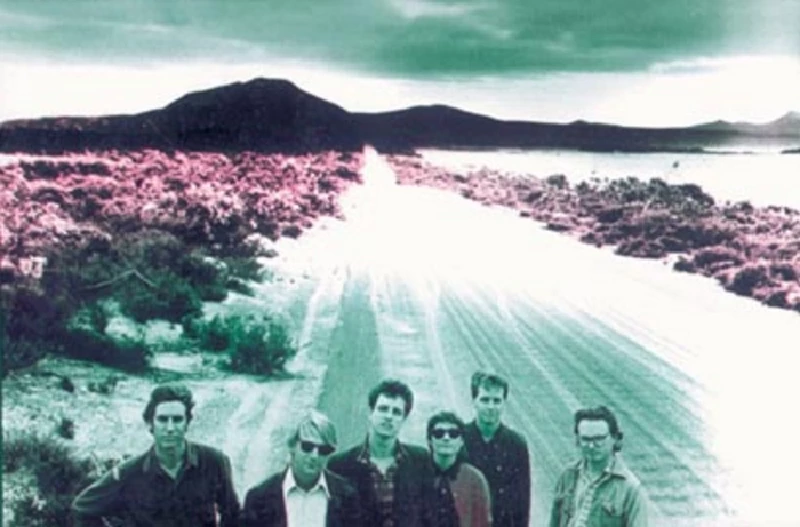
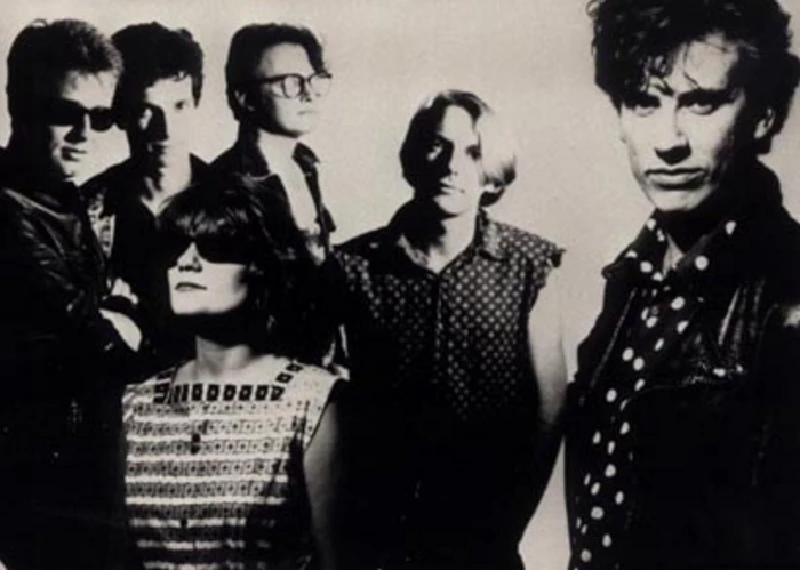
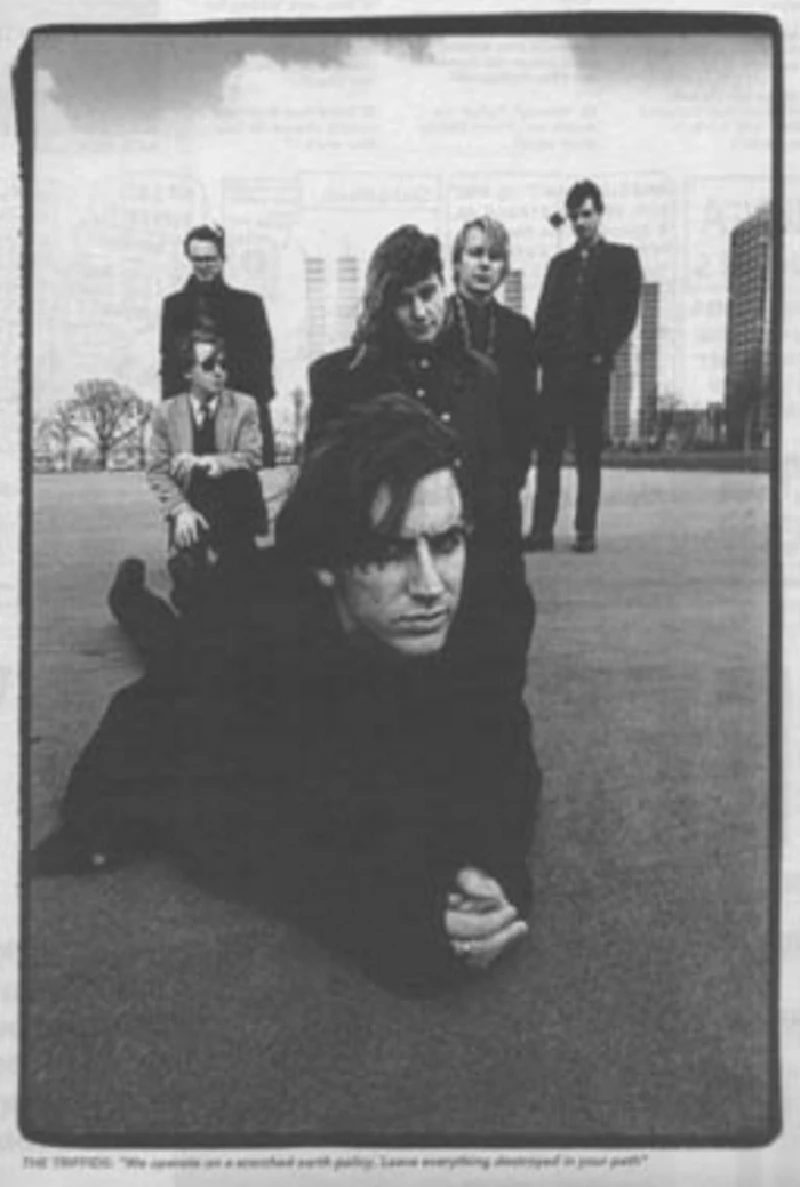
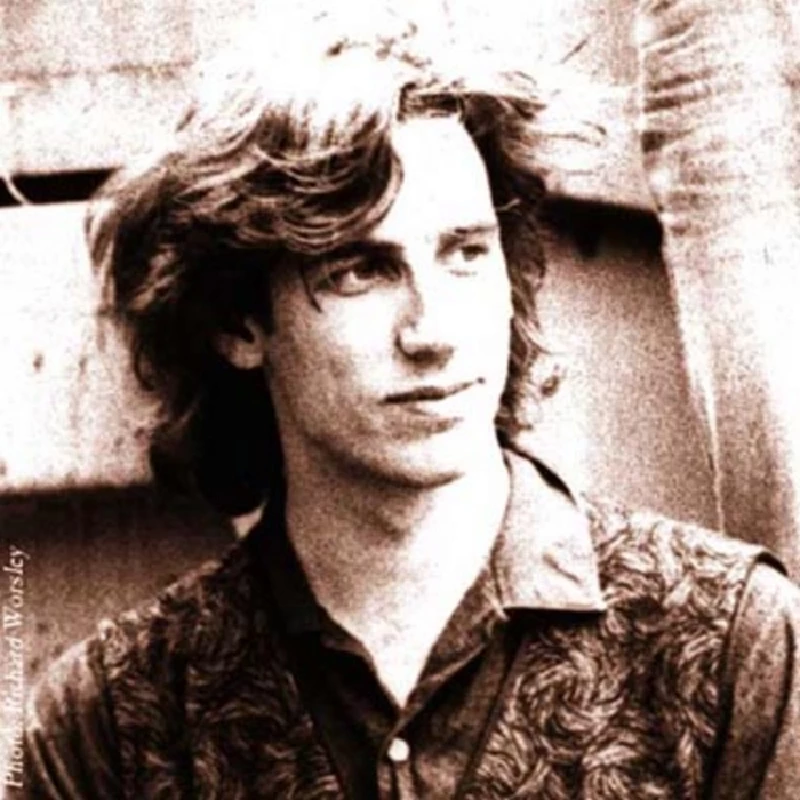
profiles |
|
In the Pines/Calenture (2007) |
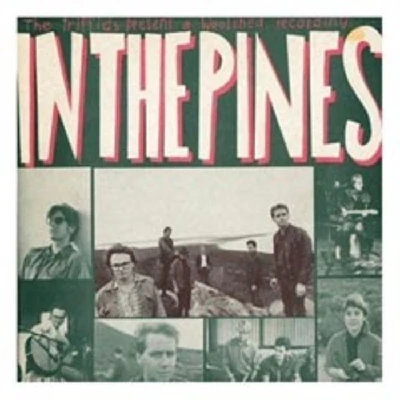
|
| John Clarkson examines the reissues and legacy of Australian group the Triffids'1986 and 1987 albums, 'In the Pines' and 'Calenture' |
live reviews |
|
Barbican, London, 9/4/2010 |
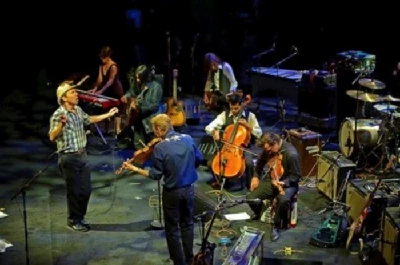
|
| Little known in their original lifetime in the 1980's but now much acclaimed, Anthony Strutt at the Barbican in London sees the surviving member of Australian group the Triffids play a heartfelt, but over lengthy tribute to their former and late singer David McComb |
favourite album |
|
Born Sandy Devotional (2006) |
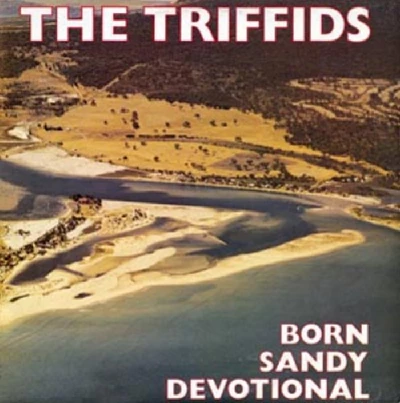
|
| In the latest in our 'Re : View' series, in which our writers re-examine albums from the past, John Clarkson looks at Australian group the Triffids' haunting 1986 masterpiece 'Born Sandy Devotional', which has just been reissued |
reviews |
|
Wide Open Road: The Best of the Triffids (2010) |
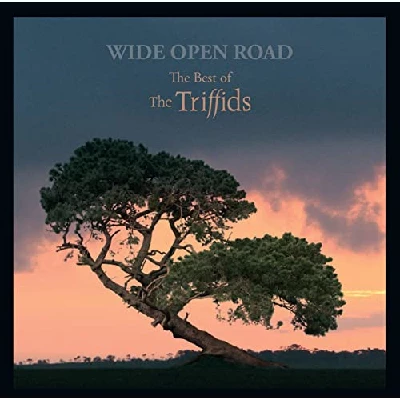
|
| Excellent compilation and also introduction to highly regarded 80's Australian band the Triffids |
most viewed articles
current edition
Tossing Seed - InterviewWaterboys - Roundhouse, London, 1/6/2025
Last of the Lovely Days - Interview
Brian Wilson - 1942-2025
Lemonheads - O2 Ritz, Manchester, 16/8/2025
Cary Baker - Down on the Corner: Adventures in Busking and Street Music
Morrissey - Photoscapes
Robert Forster - Interview
Belouis Some - Video Vault
Motorcycle Boy - Interview
previous editions
Flip Side - Raging PagesStereogram Revue - Voodoo Rooms, Edinburgh, 2/12.2015
Bob Mould - Brooklyn Bowl, O2 Academy, London, 11/2/2016
John Clarkson - A Life in Music
Bill Hicks - Profile
Ain't That Always The Way - Alan Horne After The Sound of Young Scotland 2
School - Interview
Miscellaneous - Minehead, Somerset, 8/5/2009...10/5/2009
That Petrol Emotion - That Petrol Emotion, Town and Country Club, London, 1988
Dave Greenfield - 1949-2020
most viewed reviews
current edition
Liarbilitys - VandalheartKirk Adams and Ed Woltil - Eat The Sunshine, Drink The Starshine
Big Flame - Peel Sessions 84-86
Wolf Alice - The Clearing
Good Charlotte - Motel du Cap
Silver Biplanes - Coming Up For Air
Bruce Dickinson - More Balls to Picasso
Suzie Ungerleider - Among The Evergreens
Phew, Erika Kobayashi,, Dieter Moebius - Radium Girls
Rupert Wates - Father to the Man
Pennyblackmusic Regular Contributors
Adrian Janes
Amanda J. Window
Andrew Twambley
Anthony Dhanendran
Benjamin Howarth
Cila Warncke
Daniel Cressey
Darren Aston
Dastardly
Dave Goodwin
Denzil Watson
Dominic B. Simpson
Eoghan Lyng
Fiona Hutchings
Harry Sherriff
Helen Tipping
Jamie Rowland
John Clarkson
Julie Cruickshank
Kimberly Bright
Lisa Torem
Maarten Schiethart